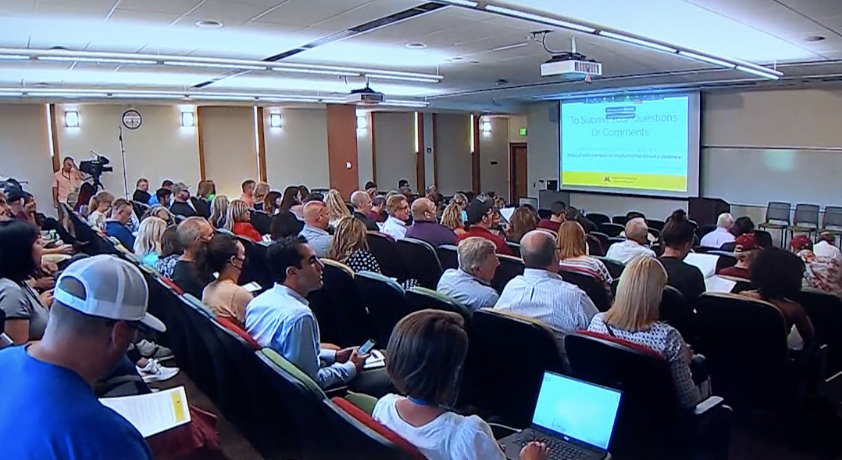July 11, 2022 UMN Safety Listening Session
[Link to original Twitter thread]
Developing:
Questions/comments brought up by parents:
Speaker 1: Board member of a new non-profit, the Campus Safety Coalition and parent of a student. Wants a more proactive approach to safety, "lights and cameras aren't doing it". Asked what metrics we use to measure safety and crime. Brought up mental health, claimed his son says he "wakes up scared for his life" every day. Explained that we shouldn't blame this on being a "national issue", we need to focus on what is happening here directly.
Frans' answer: "The metric is every day, every week, what can we do different, what more can we do? We know the situation is not improving like it should, like we want it to so what are we trying to do? We are trying to come up with new solutions, new ideas, trying to support the UMPD, trying to do whatever we can to do this. We know lighting by itself is not going to save everyone, but it provides us the opportunity to ascertain whats going on and conduct investigations"
Speaker 2: Also a board member of the Campus Safety Coalition. Former law enforcement officer, emphasized that the officers are fully supported by the parents and students who care about safety. Pointed out that the administration needs to support the officers as well. Pointed out that this is an exigent circumstance that needs unique response. "There's no reason that we can't come together in a collaborative command center" to unite the jurisdictions and communications between officers and departments.
Speaker 3: A concerned mother whose son lives on the 1700 block of University Ave. SE. "I am here to request that the U take care of their Clery geography". Claims that her son and his friends alerted the university to escalating violence on the 1721 property for two years with no response or reaction. Gave testimony of students who live on the block, a constant line of victims coming out of the house, the "house of horrors". Also claims she is speaking because the students are terrified of retaliation from the university if they speak out. "Follow the recommendations that have been given to you in the past, show that you care".
Chief Clark's answer: "I won't violate the law. The property is owned by a private entity, we cannot enter without just cause. I won't violate constitutional rights." He explained that this property is not within the U's Clery geography, it is the jurisdiction of the city.
Speaker 4: He noted that the issue here is that the President makes over a million dollars a year and could only attend 10 minutes of this meeting. Spoke on Gabel's 2020 letter cutting relationships with MPD, and the continued anti-MPD rhetoric from the university and the city. Asked 1) when is the rhetoric going to stop and when will partnerships pick up again, 2) why does the university have investments off campus and claim its not their jurisdiction to respond or alert when shootings occur there.
Speaker 5: Robert Eddy, an alum and donor, spoke next. His question involved the utilization of the broken glass policing theory.
Chief Huffman's answer: a controversial police theory from the 1990's, explained that it is a theory that states if you crack down on smaller crimes it will help deter the occurrence of larger crimes. She noted that when put into practice it led to a lot of small infractions, traffic stops, and response to "quality of life" crimes. Noted that it was meant to be a collaboration between law enforcement and the community, but when put into practice it fell out of favor because it was not truly reflective of community objectives. She went on to note that they utilize regular metrics to comb through precinct crime data and see what strategies they were implementing.
Frans noted that this is the first of many public safety forums and they will all work to continually make this community better and safer.
Speaker 6: An associate professor and mother of a student. Her son's friend was robbed at gun point during a car jacking. She asked if they can extend the Clery reporting to alert Dinkytown residents of crime occurring in their area.
Frans' answer: Pointed out that Clery is a federal guideline and the hard question is where do we draw the line on where we report and where we don't report. He clarified that the Clery Act doesn't apply to the state of Minnesota, but to the University of Minnesota. Noted that we don't have the capacity to respond to everything outside our area.
Chief Clark's answer: He offered to explore the expansion of the reporting boundaries. He also clarified that they can only send out SafeU alerts when crime gets reported. If they go off campus they will struggle with inconsistency in reporting. He offered to research and get back to them before school starts with an answer.
Sources:

